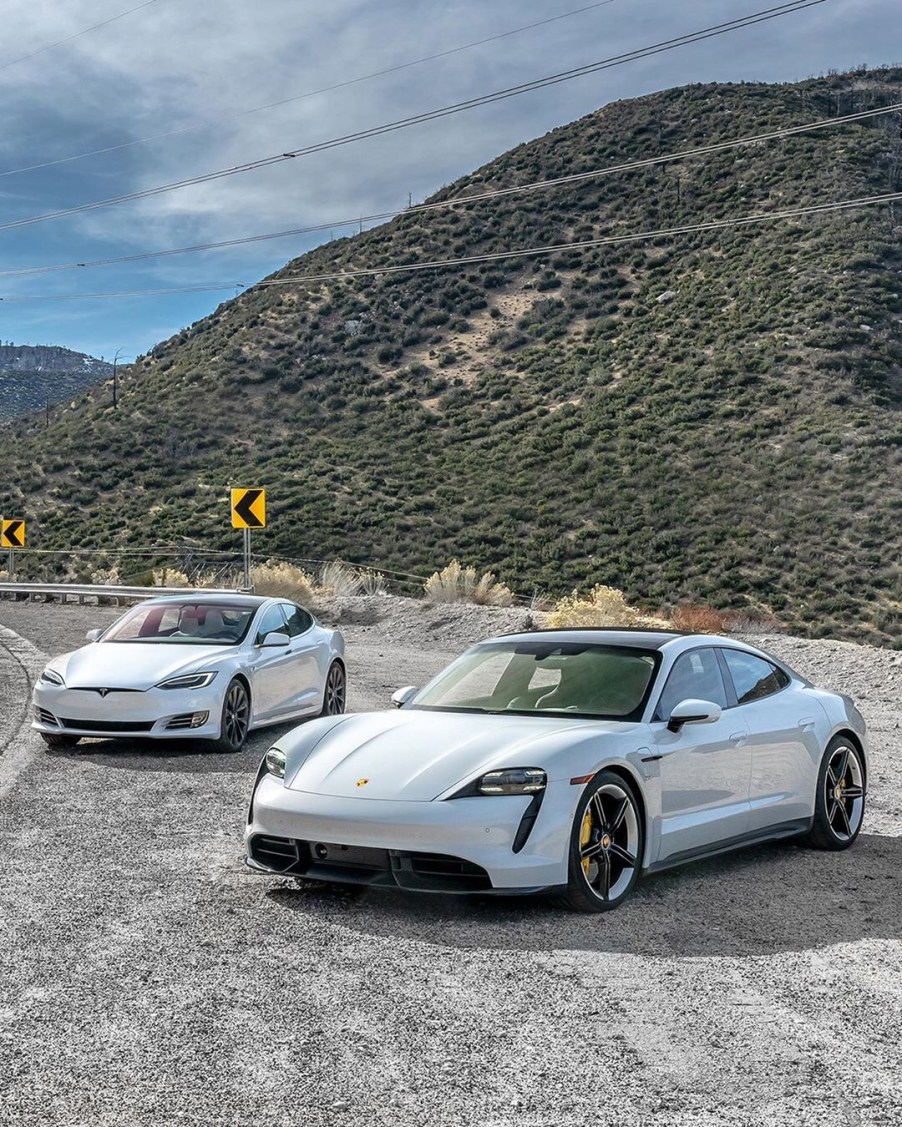
Most Electric Cars Are Really Fast…Once in a While
It’s no secret that electric cars are incredibly fast. Compared to gasoline-powered cars, electric cars generate massive torque without revving their motors. This means they can sprint off the line. The Tesla Model X SUV can go 0-60 in 2.7 seconds, for example, while the Porsche Taycan Turbo S can do it in 2.4 seconds. The Taycan, though, is actually an interesting EV in this regard. That’s because, in addition to charging faster than a Tesla, it can keep accelerating that quickly over and over again. Which is something Tesla’s cars can’t do.
A tale of two fast electric cars
In a recent comparison test, Car and Driver ranked the Tesla Model S ahead of the Porsche Taycan. That’s because, although the Porsche Taycan was faster and handled better, the Model S was the overall better—and cheaper—electric car. It also had a 13-mile-longer range. But there was something curious about the recorded 0-60 and ¼-mile times.

It’s standard practice when recording 0-60 and ¼-mile times to take an average over multiple runs. This is to rule out variations in the road surface, driver error, and so on. And, as is the case with brake tests, cars sometimes accelerate faster, sometimes slower. And, overall, that was the case with the Taycan and Model S. Except the Model S’ performance degraded significantly more than the Taycan’s.

Over 15 runs, the Porsche’s 0-60 time increased from roughly 2.5 seconds to 3 seconds. But the time didn’t really increase until run 9. The Model S, meanwhile, did 0-60 in about 2.5 seconds, but only in the first 2 runs. By run 3, the Model S’ 0-60 time had increased to 5 seconds. By the end of run 15, it had further increased to 6 seconds.
A similar situation occurred in the ¼-mile tests. The Porsche Taycan runs it in around 10.5 seconds, until after run 9 when it increases to about 11 seconds. By run 3, the Tesla Model S’ time has gone from 10.5 seconds to almost 14.
On paper, these two electric cars should be equally fast. But in the real world, the Tesla Model S doesn’t seem to have the staying power. Why is that?
Why electric cars aren’t fast for long

It’s actually the Porsche Taycan that’s more the odd-one-out. Porsche, unlike Tesla, didn’t chase after the ultimate range for its electric car. Instead, the automaker designed the Taycan for repeatable, high-speed performance.

Perhaps the biggest difference is with the Taycan’s electric motors. Jalopnik reports that Porsche’s permanent-magnet motors pack more copper than Tesla’s AC motors, which increases performance. Porsche’s motors are also designed for easier heat management—and it’s that which truly affects electric car speed.
Although most of us know that extreme cold drains batteries quickly, The Verge and Battery University report that extreme heat affects them, too. As UPS Battery Center and the journal Progress in Natural Science explain, all batteries, even lithium-ion ones, run on chemical reactions. But not all these reactions are beneficial. Think of it like how an ICE produces both useful energy as well as soot, smog, and other emissions.
When electric car drivers want to go fast, that draws more current from the battery pack. This creates heat, which, unless properly-managed, actually degrades performance. That’s why, in addition to the different motors, the Taycan uses a higher voltage system than the Model S. It means the car needs less current to produce the same amount of power, so less heat is produced.
Are gasoline-powered cars any better?

While it is true that gasoline-powered cars aren’t as fast as electric cars, they are often more reliably fast. For example, when Motor Trend ran a Ford Edge ST through repeated back-to-back autocross course runs, the engine never overheated, and performance never dropped.
That’s something that the Tesla Model S wouldn’t be able to do. In fact, The Drive reports that Tesla had to issue an update to limit how many times their cars could do repeated full-power launches.
As ISSIMI points out, though, ICE repeatability wasn’t always the case. Running back-to-back 0-60 test runs wreaks havoc on a car’s drivetrain. Clutches are smoked, gears grind, etc etc. And sometimes even supercars like the Ferrari Enzo couldn’t keep up. Even supercars with launch controls struggled with this kind of abuse.

The Drive reports that early R35 Nissan GT-R owners actually filed a lawsuit against the automaker because the built-in launch control was basically destroying the cars. Nissan actually had to remove the feature for a few years so it could strengthen the GT-R’s components enough. The Drive reports that this continues to be an issue for modern supercars, too, like Lamborghini’s Huracan.
That being said, when it comes to performance repeatability, Porsche’s gasoline-powered cars are just as good as its electric cars. Porsche’s dual-clutch PDK, according to Road & Track, can handle “over 1000 full-throttle launch control starts in a row without failure.”
In short, while many electric cars are very fast, if they’re not built like the Porsche Taycan, they’re not that fast for long.
Follow more updates from MotorBiscuit on our Facebook page.


